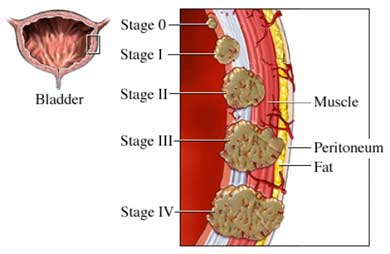Hi David- On January 22nd I had tumors removed and chemo inserted in my bladder. Pathology stage 1.
March 1st I’m scheduled for another surgery to scrape again, look for growth or return and insert a bacteria form from TB.
My doctor and surgeon is a urologist which I feel very confident with. My question is at what point is an oncologist bought in and who initiates it?
Hi Beverly-
I am sorry to read of your bladder cancer diagnosis. However, if your stage was 1 and your bladder cancer is low grade, you have excellent chances of living a long life.
Do you know how many tumors were removed from your bladder on January 22? Do you know the size of the tumors that were removed? When you say “ insert a bacteria form from TB” I take you to mean that you will undergo BCG vaccine therapy.
Regarding your question
“My question is at what point is an oncologist bought in and who initiates it?”
My guess is that your urologist is consulting with oncologists at your hospital. If you would like to speak to an oncologist in addition to your urologist, which makes sense, you simply need to have your urologist recommend one or find one on your own.
My point is that it is the normal practice to have a cancer “team” that helps you. Your oncologist can help coordinate your team. In addition, I can provide research and information about both conventional and non-conventional bladder cancer therapies. My experience has shown that a spectrum of therapies from anti-angiogenic nutrition to antioxidant supplementation to enhance BCG therapy to other lifestyle therapies will increase your quality of life while reducing your risks of bladder cancer relapse.
Let me know if you have any other questions.
David Emerson
- Cancer Survivor
- Cancer Coach
- Director PeopleBeatingCancer
Hello David!
Thank you for your prompt response! You’re correct as far as the BCG vaccine therapy. I am stage 1 and only see high grade in the report below. To my knowledge 3 tumors were removed along with at least 20 microscopic ones, a third of my bladder lining was removed, as I understand, that will grow back. I scheduled an appointment next week with a highly regarded oncologist.
I would be interested in any therapies you can share with me. I’ve used herbs and supplements as needed for decades and until now rarely had any medical issues. Below is the pathology report, which I’m sure you understand better than I can. I look forward to hearing from you and I welcome any recommendations and options you provide. Thanks again for responding.
Beverly
Hi Beverly-
I agree with your reading of your pathology report- yes you are stage 1 and yes your tumors are high grade. At your appointment next week please ask your oncologist to explain “invading” into muscles yet “not involved.” Please confirm with your onc. but my understanding is the your prognosis and therapy depends on:
1) stage (good)
2) grade (not so good)
3) and whether or not your cancer breaks through your bladder wall.
Bladder Cancer stage 1- according to the study linked and excerpted below, curcumin can enhance the efficacy of BCG.
Let me know if you have any questions. Thanks.
David Emerson
- Cancer Survivor
- Cancer Coach
- Director PeopleBeatingCancer
“Although Bacillus Calmette-Guerin (BCG) intravesical thera- py is a standard treatment for bladder cancer, eventual fail- ure of response is a major problem. Treatments that can augment BCG therapy are urgently needed.
We investigated whether curcumin, a component of Curcuma longa (also called turmeric), has potential to improve the current thera- py using in vitro and in vivo MBT-2 murine tumor models. We found that curcumin potentiated BCG-induced apoptosis of human bladder cancer cells.
BCG stimulated the release of tumor necrosis factor–related apoptosis-inducing ligand (TRAIL) from peripheral mononuclear neutrophils in a dose- and time-dependent manner, whereas curcumin enhanced the upregulation of TRAIL receptors.
Electrophoretic mobili- ty shift assay revealed that curcumin also suppressed the BCG-induced activation of the cell survival transcription fac- tor NF-κB. In a syngeneic bladder cancer model, curcumin alone reduced the bladder tumor volume, but a significantly greater reduction was observed when BCG and curcumin were used in combination (P < 0.0001 versus control; P < 0.003 versus BCG alone). This was accompanied by a signifi- cant decrease in the proliferation marker Ki-67 (P < 0.01 ver- sus control; P < 0.01 versus BCG alone) and microvessel density (CD31; P < 0.01 versus control; P < 0.01 versus BCG alone), decreased NF-κB in tumor tissue compared with the control, induced apoptosis, and decreased cyclin D1, vascular endothelial growth factor, cyclooxygenase-2, c-myc, and Bcl-2 expression in the tumor tissue. Upregulation of TRAIL recep- tor by the combination was also observed in tumor tissues.
Overall, our results suggest that curcumin potentiates the antitumor effect of BCG through the inhibition of NF-κB and induction of TRAIL receptors in bladder cancer cells. [Cancer Res 2009;69(23):8958–66]


